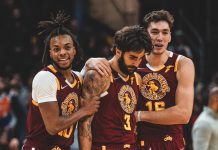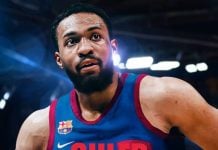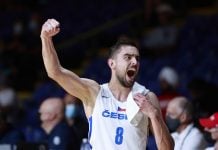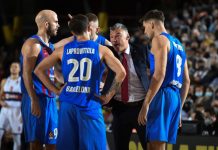“I own a sports agency. We have a beautiful facility in Miami”, Pete Mickeal describes his current occupation talking over the phone to TalkBasket.net.
Moving into the agency business was a logical step for the former FC Barcelona great, who retired in 2017 at 39. Apart from having been a first-class small-forward for many teams throughout his basketball career, Mickeal worked also as a scouter for the Minnesota Timberwolves and the Washington Wizards.
A second-round Draft pick by the Dallas Mavericks in 2000, he never actually played in the league, albeit participating in several training camps and Summer Leagues. As has been the case for many aspiring athletes, Pete Mickeal got a good taste of the NBA only after his playing time was over.
Now, at 42, he puts his extensive knowledge of the game to good use in order to run a company that specializes in “taking the minor league players, but also the NBA player that doesn’t get any playing time, and sending them overseas“. Hence, Pete Mickeal is the right person to address issues and trends in world basketball: the NBA “copycat” teams, the Euroleague turning more into one-man shows and players having to settle for less in order to cross the ocean.
Moreover, the 2010 Euroleague champion with FC Barcelona recalls the Spanish side’s triumph (92-88) over the reigning NBA champs LA Lakers at the legendary Palau Sant Jordi on October 7, 2010. Mickeal registered 26 points, 13 rebounds and 7 assists, as well as heaps of tenacity, in what is widely regarded as one of his career-best performances. Playing against Kobe Bryant, Metta World Peace (then Ron Artest), Lamar Odom, Derek Fisher and Pau Gasol was a highlight in itself, but the Rock Island wingman was anything but intimidated.
In fact, when Kobe Bryant came by to say: “Hey, this game can take you to the NBA” , Mickeal readily responded: “If you think that, then put your money where your mouth is and play one-on-one and we’ll see where your game is at”. If being a fierce competitor on the court meant going up against the best, Mickeal -and that particular Barcelona team- were not going to miss out on their date with history.
All the details are included in the lines below.
Q: It’s been ten years since FC Barcelona beat the Lakers. Did you notice?
A: Know what? I didn’t even realize it was ten years ago. Time goes by so fast and it seems like yesterday. It was a very good and memorable experience for me and all basketball people in Barcelona.
Q: What was the main reason that made the game so important?
A: We were EuroLeague champs in 2010 and we carried that momentum into the next season. The team was together for two years and we knew each other very well. The most important thing is that we wanted to have fun, show our fans that we were ready to repeat as EuroLeague champs and that we were able to compete with any team in the world.
Q: Would you say that Barca was world champion back then?
A: No, it was a pre-season game. We had a huge advantage because we had been in preseason for over 45 days compared to the Lakers. My son was there to watch the game, which was very important. It was fun making history because when you’re playing the Lakers, they force you to do your best. You got to look at our roster. All of our team was filled with NBA Draft picks. We’re talking about high-level players and that’s what made us so special.
Q: How did the Lakers approach the game?
A: They obviously took the game seriously because I remember they were winning most of the time. They wanted to get in their rhythm. I think Pau Gasol helped them get ready. They were really talented and their size was just amazing. Lamar Odom, Pau Gasol, Kobe and Ron Artest were incredibly physically gifted.
Q: How big was the anticipation for you and the whole team going into that game?
A: I was super motivated because I knew I had to guard Kobe. Xavi Pascual was not going to put any other player to guard him; only me. So, I was mentally prepared. I’m a competitor. I took it personally and I was 100% focused on playing defense and scoring. It was a chance for me to show people back home in the States my all-around game and my versatility.
Q: What was the aftermath of that game? Did you get calls from friends, relatives or even offers from NBA teams?
A: In 2010, I turned down some NBA offers. It was just after we won the EuroLeague. In 2011, I was trying to build a momentum in order to land some bigger NBA contracts. The game was on ESPN, NBA TV and millions of people were watching. I got a call from everyone I know. I had maybe the longest blog in the history of HoopsHype, which went for about two years. When I was playing with Ricky Rubio, people in the States started asking who that Pete Maravich-like kid was because everyone was talking about him. I was able to market my teammate to the world. I thought the world of him as a person and I regarded him as a super good basketball player, especially considering his age. From there, my blog got really popular.
Q: What happened between you and Ron Artest during and after the game?
A: It started before. They asked Ron Artest: “What do you think about going to guard Pete Mickeal, one of the best players in Europe?” and he goes: “Pete who? I don’t know who that is”. That’s where it started. Every player has the scouting report of the opponent. You study that report, regardless if you’re the best in the world or you’re playing in a lower division. So, I took that as a form of disrespect and that really motivated to play against the Lakers. In the first play of the game I shoved my elbow in his face. That’s how I used to send a statement to a player throughout my whole career: “Hey, I’m the hardest guy on the floor- not you”.
Q: If you had him in front of you, what would you tell him?
A: I wouldn’t tell him anything. It’s just basketball. American players understand what I’m saying. There’s nothing personal. But once the game starts, I have no friends and I don’t care who you are. I’m going to destroy you. Whoever stands in front of me, I’m going to impose my will on them. I’m an asshole on the basketball court. When the game was over, I’m back to normal. Me and Kobe talked about giving me a jersey for my son and he told me: “No problem. Get in touch with my people in LA and I’ll send you one”. That was our last conversation. The truth is I never got in touch with his people, but I should have. Kobe had only good words to say about me and the same goes for me too.
Q: Did he know about you as a player?
A: I think he’s a different guy. He grew up in Italy, so he always respected Europe. I know that he loved soccer and I’m sure Pau gave some info on who we were. He was a good student of the game.
Q: Is it true that you challenged him to a one-on-one?
A: Yes, it is. The game was so competitive and Kobe roughed me up a little bit, putting his finger up to my face telling me to calm down. That was the turning point when I got really competitive and told him: “Anytime you want to play one-on-one, we can do it. And I guarantee I’ll win”.
Q: Do you believe that particular Barcelona team would have been able to compete in the NBA?
A: I most definitely do. If you look at how the NBA was ten years ago, it’s not the same as now. We had everything you need to play at that level: size and length, having N’Dong, Vazquez and Lorbek who were between 6’8” and 6’9”, and also players who could shoot the ball like Juan Carlos Navarro. I’m not saying that we’d be a play-off team, but we would definitely compete at that level; we would win games. I’ve been in the NBA as a front-office exec and I understand there’s more to it than just basketball.

Q: You were drafted in 2000 by the Dalllas Mavericks. In 2013, HoopsHype reported that the Lakers were considering your case. Did you ever receive an offer from them?
A: That’s an interesting question. The NBA is always doing their homework on players, looking around if there’s some high-level player in Europe that’s willing to come over for the minimum. I was an NBA scout for years and I understand the process. Did I get to the point where they offered me a contract and I said no? The answer is negative. But, did other teams ever consider giving me a contract? Yes. The Lakers situation was different because I never had a formal offer from them, but I did have one from another team. I’m not going to say which one it was, but I’ll tell you that they play in the Eastern Conference and they were a really good team.
I felt comfortable being in Barcelona and it worked for me because my son was born there. It’s one of the places that I consider retiring in the future. My wife loves Barcelona and I can’t disappoint her.
Q: Having seen both Europe and the NBA, would you say that European teams get underpaid to release their stars?
A: There’s some guys with huge buyouts. To give you an example, I had a 3 million euro buyout in my contract with Barcelona. That was impossible for an NBA team to pay because all they could give was $750,000. If they wanted to pay more, they’d lose cap space. This is why teams want the players to pay it. It’s very difficult for top Euro players to go to the NBA unless they’re willing to take less money. The problem is that you have to pay your agent in the States, a buyout out of your contract and almost 40% tax of that money. Then, you have to pay for life expenses, like food, house, car etc. In the end, you don’t make that much money.
If you play on a top European team, like Barcelona or CSKA, you live a lot better and you save yourself a lot of money. So, guys who really want to play in the NBA, they do it. Because -win or lose- they think of themselves as NBA players. Guys like Vassilis Spanoulis could have played longer in the NBA. For Europeans, its’ a tough situation because they often don’t play much unless they’re a Jokic. If they don’t have star potential, they’ll be the 12th-15th man on the roster. In that case, they won’t play, won’t practice; instead, they get lazy and out of shape. It becomes very difficult to show what they can do when their call comes.
My situation was different because I had gotten to a place where I felt the most comfortable in my life. I met my wife there, won the EuroLeague and my life changed. The key for me was Barcelona offering a two-year contract. I never had a two-year deal in my whole career and I was looking for some stability. I didn’t want to go to the NBA for the minimum. You can’t control your playing time there. You have to get a promise that you’re going to get a certain amount of minutes or you don’t go. When you’re young, it’s easier. So, I don’t regret my decision because I made the right call for my career.
Q: If you had to choose one NBA team to play for, which would it be?
A: Right now, I’d play for the Miami Heat because that’s my style. They measure your weight every week; they take body fat tests every Monday and fine players who don’t have certain percentages; they have conditioning tests all through the season. They are more of a European than an NBA team. They have very good structure. People say: “I’m going to South Beach and play in Miami”. Well, it ain’t no South Beach when you get to Miami. It’s all work. There’s no party or fun time. As soon as you step in the gym, you’re held accountable for what you do off the court. They make sure that you’re eating and that you’re getting your rest. Those are the type of teams I wanted to play for because I know that every other player will be held accountable just like I am.
NBA teams obviously are not the same. Rules say that you have only one contact practice a day. In Europe, you might get two. There’s also a time limit in pre-season on how long a guy can practise. In Europe, you might run in the mountains, then come back and have a practice. I love toughness and when other players are willing to fight with me.
Q: How were things on the two teams you worked for, Minnesota and Washington?
A: Great. I got to work for two years for one of the smartest, most seasoned veterans in the world: Tom Thibodeau. If your first job is with him, I believe I’ve signed up for a very good career. He holds his scouts accountable just like he holds his players. He trusted that I was going to do the work to the best of my ability. The relationship we had when he was with the Knicks in 2000, when he worked me out in the two Summer Leagues I played for him, keeps up and I think he appreciates me a lot. I was very fortunate to get hired by that organization. There’s really good people there. Working with Johnny Rogers, one of the great players in Europe, was good for me because he was the one who talked Tom into hiring me.
Q: According to a recent survey, over the last twenty years there’s been a tremendous increase in the number of US players in the EuroLeague, as well as of non-US players in the NBA. How would you explain the trend?
A: That tells you that there are many high-level Americans playing in Europe, some of whom are either ex NBAers or former NBA Draft picks. Right now, EuroLeague teams can have unlimited number of Americans on their roster and every team has at least two. They’re looked at as some of the best in the world. Teams like CSKA have three or four of them and that’s why they’re always going to be successful. It’s a trend of more high-level players compared to before.
As far as Europeans in the NBA, San Antonio put the world on notice. They got Ginobili, Parker, Splitter and their best players were non-Americans. At one point, they created a dynasty. The NBA is a copycat league. After the Spurs succeeded, all teams got high-level European players. Golden State had a dynasty shooting threes, so now the whole NBA is doing the same- even guys who can’t shoot the ball well. There’s some teams that say: “No midrange; either three-point shots or straight to the basket”. Strategy-wise, Europeans have always been able to shoot and now it’s normal to bring over some of them.

Q: What’s the main feature of the EuroLeague?
A: EuroLeague has trends also. Now, there’s more individual play than in the past. I was in the Final Four of the EuroLeague in Vitoria last year and I saw more individual play than team basketball. Europe used to be “pass and play for the team”. Now, it’s like “give this guy the ball, let him play pick’n’roll, switch screens after they switch, take advantage of the mismatch and play one-on-one”. Before, if you didn’t make the extra pass, it was because you were not focused or didn’t want to be a team player. Even though you still see team basketball, I think that this trend is very good for the fans who want to see exciting basketball and individual athletic players who can shoot the ball. If you bring a player over and you pay him millions of dollars to play in the EuroLeague, you don’t want to take away from his game what he does well.
Q: What has your experience from both sides of the Atlantic taught you?
A: Playing in Europe teaches you to be tough because there’s no handouts. Europe is right now. Coaches want to win now and there’s no player development unless you’re a local player for a lower division team. When you’re an American and you play bad, then you’re out. In the NBA, if they give you a five-year deal, they might continue to pay your money in case you play bad. Two-way contracts are good if you can get your player a guaranteed number of games. If he’s not to play in the NBA at all, it doesn’t make sense putting him on such a contract.
Q: In the case of Luka Doncic, what made the difference? Was it the Mavericks organization or his readiness to respond based on his EuroLeague experience and excellence?
A: Everything he has, he earned. When he first came over, many didn’t give him respect because he’s a EuroLeague guy, he didn’t have 6-pack abs, he was not in great shape. He was more than ready for the NBA. I told everyone that when a player is EuroLeague and Spanish finals MVP in the same year at any age, that tells you he’s a rare, special talent. Even if he’s not that athletic, it depends on what system he’s in and on how he plays. Luka has great size, is crafty and nobody can stand in front of him. No one has been able to guard him one-on-one. He’s one step ahead of everybody when he has the ball in his hands. The Mavericks gave him help, signing Porzingis, and that team is fine for the future.
Q: Would you credit the Bucks for entrusting Giannis with their future?
A: They took the risk and bet on this guy. You got to give the scouts credit for telling the assistant GM to take a look at him. Giannis gets credit for developing his skill set and becoming a monster. He still can get better; he had the work ethic to do it and I don’t know if his future is going to be in Milwaukee or somewhere else. He has already made history, winning back-to-back MVP awards. I’d give the MVP to LeBron this year, but Giannis had a great year also. The team is doing everything they can to make him feel comfortable and stay. Giannis is one of those players that will stay with one team, creating his own legacy there. It’s easy to go to another team and ask for a trade, but he’s the type of guy that’s going to try and do it the hard way.
















